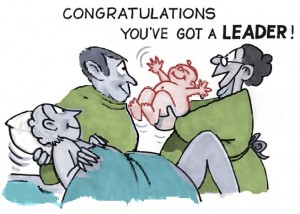 Are leaders born or made? This question dominated leadership thinking until the 1940s and, despite the growth in leadership development (particularly since the 1960s and 1970s) is a question that is still frequently asked.
Are leaders born or made? This question dominated leadership thinking until the 1940s and, despite the growth in leadership development (particularly since the 1960s and 1970s) is a question that is still frequently asked.
The question (or its answer perhaps) is usually framed in terms of ‘personality’ on one hand and ‘skills and abilities’ on the other. The suggestion is that ‘personality’ is what we are born with, whilst many of our ‘skills and abilities’ can be learned. We can achieve this learning to some degree of effectiveness or another. However , as human beings we have enormously elastic capabilities – our learning is often governed by choice, not just genes.
When I discuss practical leadership – working with people to get things done, I use a simple three-part model – Head, Heart and Guts. An imbalance in one of these three dimensions would make us appear cold, or gushing, or irrational, or inconsistent, or unpredictable, or a steamroller, or someone who bends in every wind (or worse).
Covey talks about balancing ‘consideration’ with ‘courage’ (Heart versus Guts), but we also know we need to balance our ‘rational’ side with ’emotional’ empathy (Head versus Heart), and we also need to balance Guts with Head! If you want to develop as an effective leader, then your skills in planning and decision-making need to be combined with interpersonal skills and the development of sound judgement.
Reading:
Covey, S. (1989) 7 Habits of Highly Effective People, Simon & Shuster, New York, NY.
Jacobs, C.J. (2009) Management Rewired: Why Feedback Doesn’t Work and Other Surprising Lessons from the Latest Brain Science. Penguin Group Portfolio, NY

Leaders have a variety of skills that they acquire over their career to allow them to be in a key position within an organisation. Leaders are not only defined by their skills, leaders are capable of adapting quickly to change, managing organisations in periods of distress and achieving results regardless of internal/external environmental factors.
Thanks for the comment Shirley. This is absolutely true. The accrual of experiences and self-development enable people to develop attributes of judgement and adaptability which are important attributes. ‘Skill’ is a narrow word, and leadership involves a much broader set of capabilities, including things like empathy and humility which not learned in the traditional sense. This certainly relates to the abilities needed to manage in times of major change, distress and challenge. At the same time, it is important for leaders not to rely solely on ‘experience’ since those previous circumstances may be very different from today’s. In this way a leader also needs to be ready to seek knowledge and understand what is happening now – and why – and what might need to be done.
I think that “behaviours” is a much better descriptor than “skills”. Each change or crisis is going to be different, you can’t use the same toolkit every time, but the general approach that you take can be the same. It’s difficult to develop behaviours from a training course, by reading Covey, or even “being born with them. I found it much better to have role models – not necessarily a single one, but different people who I admired for particular strengths. That way, you can vicariously tap into their experiences, both successes and failures.
This is an important point, Brian. We see people’s behaviours (what they do and how they do it and how they say things) – they are the outward sign of that internal world, our heads (how we think, what we assume, what we value, our commitments etc.). In this way role modelling is vital as we see the real-life expression of how people operate. As you say, it is important to see both the successful and unsuccessful approaches of others – and also be able to apply the same reflection on our own approach. In that way we can better master the things that are going to help us be more effective. It is an on-going learning process because of the difference between one situation and the next.
I agree, having several behavioural approaches to apply in a variety of situations is essential, as are role models to base these behavioural approaches upon. Reflection is another important aspect which is often overlooked or not allocated sufficient time, possibly due to time constraints and increasing workloads. Reflecting on situations and analysing the approach, response and effectiveness of the outcome, helps to adapt and refine behavioural approaches according to a changeable environment. Considering appropriate behavioural approaches or the need to adapt approaches to apply in various cultural contexts is another important aspect.
I think that your point on reflection is important, Charlene. We need to behave outwardly in ways which are consistent with our ‘internal world’ otherwise we will put stress on ourselves – we cannot just ‘act it out’. Reflection is a discipline which allows us to think about what would really work and how we might value a different outcome, so we can then tackle new ways of doing things in both an authentic and enquiring manner. Reflection is, as you mention, an often undervalued learning process. We need to be able to Reflect, adapt, reflect and continue to adapt as context demands – just as you say. Many thanks for your input.